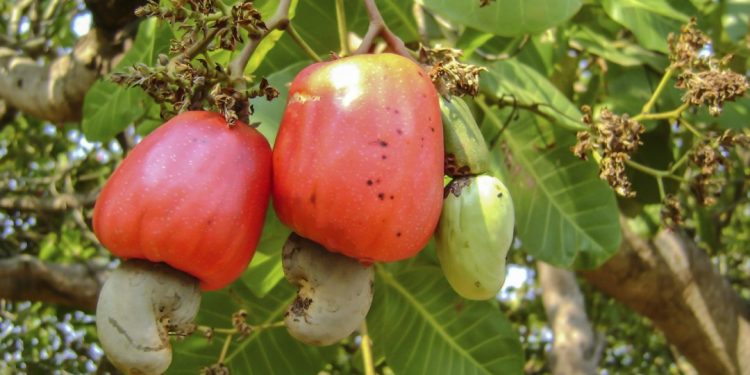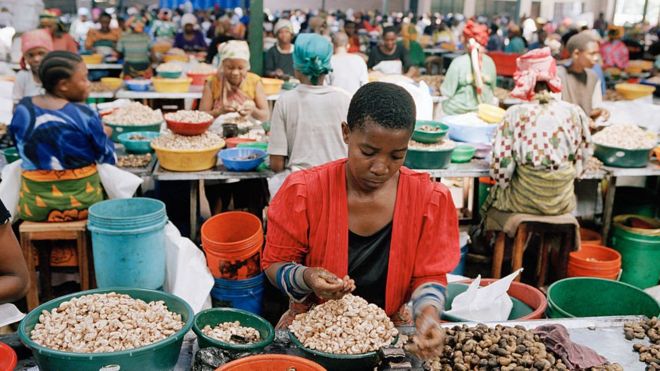Since its introduction into Africa by Portuguese explorers in the 16th century, cashew has spread across the entire continent, especially in tropical West Africa.
However, from being grown to stop desertification and erosion decades ago, cashew has now become an important economic commodity.
Today, the cashew industry is contributing significantly to the economic growth of several African countries, including Cote d’Ivoire, Guinea Bissau, Benin, and Ghana, among others, especially in job creation and revenue generation through the export of cashew nuts.
Cashew grows well in tropical and subtropical regions of the world. It explains why about 60% of the world’s raw cashew nuts (RCNs) are produced in Africa, with West Africa producing over 45% of global cashews. To the layperson, therefore, cashew is drought resistant and so the harsh weather in West Africa should not affect production.
However, it has been observed from the weekly African Cashew Alliance (ACA) reports from various West African cashew-producing countries and made more evident by research that, unfavourable weather conditions are affecting cashew production. This article examines why the weather in West Africa is affecting the production of cashew, a crop widely known to be drought resistant, and how this can be managed.
According to a Senior Researcher with the Cocoa Research Institute of Ghana (CRIG), Dr Paul K. K. Adu-Gyamfi, the drought resistance of cashew has been wrongly perceived.
This, he explains, is because for a very long time, “cashew was grown as an afforestation crop to provide cover in the marginal environment without any interest in their fruits or nuts”. Not much attention was thus paid to the yields and productivity of cashew plants.
However, in recent years, cashew has become an important commodity with a lot of economic interest in the fruits and nuts. He explains that, “the variable yields and seedling survival rates across different ecologies in most of the West African producing countries suggest that cashew is susceptible to drought, despite being more robust than other tree crops like cocoa”.
For optimum cashew productivity, a positive combination of several environmental factors is required. Citing several studies, Dr Adu-Gyamfi highlighted the importance of the right proportion of rainfall, temperature and drought required for optimum productivity.
“Cashew requires an annual rainfall range of 1500 – 2000 mm (Sys et al. 1993) and a temperature range of 25 – 28 ᵒC (Dendena and Corsi 2014) with a pronounced dry period of 5 – 6 months (Dedzoe et al. 2001) for optimum productivity,” he highlighted.
However, due to recent climatic changes, some cashew-producing countries are experiencing unfavourable weather conditions for cashew productivity. In Benin for instance, Dr Joseph TOKORE, Programs Officer (Benin) of the USDA West Africa PRO-Cashew Project and cashew researcher, explains that the average annual rainfall in recent years ranges between 800 and 1100mm which is sometimes below the level needed by the cashew trees. The situation is not so different in several cashew-producing countries. This, coupled with the high temperature and long drought usually experienced, affect cashew at the most critical stages of production resulting in poor seedling growth during the vegetative stage leading to a high mortality rate and the withering of flowers during the reproductive stage. This consequently affects the growth rate and the yield of cashew, respectively.
An analysis of the relationship between the amount of rainfall and cashew nuts yield in Benin for instance shows that, while yields do not systematically evolve in proportion to rainfall, a good distribution of rainfall over time is necessary for a good yield and therefore a good production, Dr TOKORE analyzed.
Aside from this, the harmattan in Benin and some West African countries are usually characterized by “dry wind, cold at night and hot during the day, transporting dusty particles from the North to the East, that strongly contributes to the destruction of the cashew flowers,”.
“Indeed, this dust is composed of plant particles (grasses, dry flowers, pollen), animal particles (bird feathers, waste of all kinds), germs, viruses, parasites, and microscopic fungi, that are a source of plant and human diseases,” he highlighted.
Managing the impact of hostile weather conditions on cashew production
While cashew farmers may not have control over the weather conditions, they can certainly manage their impact on cashew production. Three key points, according to Dr Adu-Gyimffi and Dr TOKORE, are necessary in this regard: using improved planting materials; increasing soil fertility; and, pest and disease control.
Through research, improved cashew planting materials have been developed by various agricultural research institutes in West Africa. These improved cashew varieties are not only high yielding and resistant to pests and diseases, but are, according to Dr Adu-Gyamfi, also “tolerant to moisture and temperature stress”. Using recommended improved grafted clones and seedings reduces the impact of hostile weather conditions on production.
Beyond this, farmers must increase the fertility of the soil of their cashew plantations, especially young plantations below five years, using organic manure. This increases the moisture retention rate of the soil and helps in reducing mortality, especially during the vegetative stage of cashew production when faced with hostile temperatures. Drip irrigation, according to Dr TOKORE, is highly recommended during the dry season, especially for young cashew plantations within the first two years after planting, to reduce the impact of hostile weather.
Because the harmattan in West African countries like Benin carries dust particles that bring pests and diseases on cashew plantations, appropriate pest and disease control is necessary to reduce the impact on production. This requires adherence to the use of recommended and safe pest and disease control mechanisms that do not compromise the safety of consumers of cashew and have a “minimal effect on the environment”.







